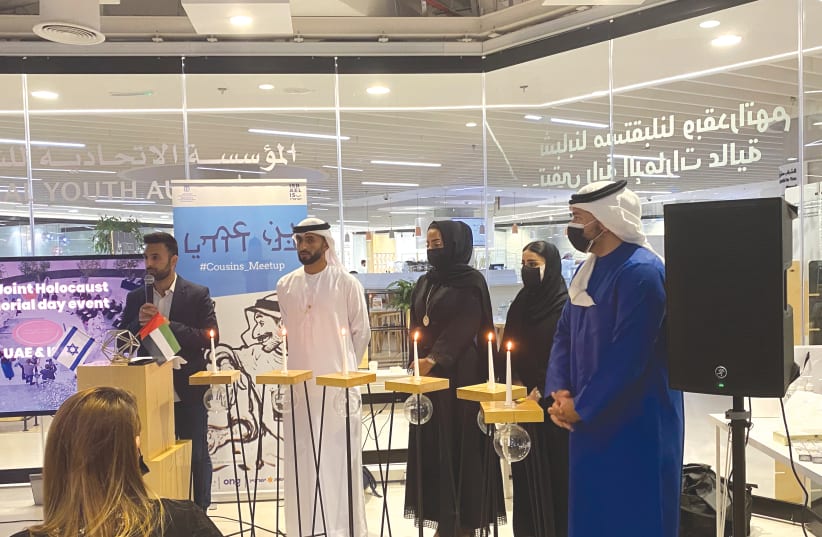Since the signing of the Abraham Accords, there’s been somewhat of a love affair between Israel and the United Arab Emirates. But unlike the peace agreements between Israel and other Arab states, the relations with the UAE continue to grow on the government and nongovernment level, and if you were following some of Israel’s or the UAE’s influencers online last week, you’d see just how much.
Last week, a delegation of Israeli influencers and social media content creators traveled to Dubai to collaborate with Emirati influencers – including influencers from outside of the political sphere completely, such as Israeli singers Stephane Legar and Loai Ali. The delegation, organized by the Strategic Affairs Ministry and Israel-is, connected over 40 social media influencers from the UAE, Bahrain, Saudi Arabia and Israel, with a combined following of over 15 million people.
Throughout the week, Instagram, Twitter and other platforms were flooded with participants sharing powerful stories of how surprisingly similar Israelis and Emiratis are.
For many of the Israeli participants, they were surprised to find just how comfortable they felt in Dubai – a stark contrast to traveling to other Arab countries.
For the Emiratis, they were excited to finally be meeting Israelis in person for the first time. Some of the participants had even participated in virtual meetings with Israelis for months leading up the delegation.
From discussing a shared vision for the future to social activities like Jeep rides in the desert, participants were able to normalize Israeli-Emirati relations, all through the lens of social media.
Even more powerful, they witnessed history with the first-ever Holocaust memorial event held in an Arab country. This was an exercise not only in Holocaust education, but in taking action on a human level. In a symbolic display, three Emiratis and one Saudi lit memorial candles in the event.
Whether Jewish, Christian, Druze or Arab, there wasn’t a dry eye in the room by the time the event had concluded.
This peace, at its core, is successful because there is a people-to-people connection. But it’s important to note that there is people-to-people connection only because the UAE has fostered an environment that is completely different from what we’ve seen with previous peace agreements, and that is precisely the reason it’s working so well.
Openness to dialogue, to discussion, to difference is critical to changing old ways, especially in the Middle East. That is precisely what Mohammed bin Zayed has done. Dubai’s international appeal is a symbolic example of what a forward-looking society can look like in the Middle East.
The Abraham Accords, like the peace agreement with Egypt and with Jordan, was a top-down government decision. But while Egypt continued to foster hate and teach incitement to the public for decades, while also working with Israel at the same time, the UAE’s courage in forging a new path by immediately teaching about tolerance, about Jewish history, about the State of Israel, opened the doors to a new Middle East.
In working with Israeli companies in the private sector, and in collaborating on healthcare, security and finance, while encouraging people-to-people relations and collaborations, both parties – the UAE and Israel – have set a stellar example of what people can do for the future of the entire region, and that vision is already manifesting itself.
As we know, UAE’s peace with Israel set in motion normalization agreements with Sudan, Bahrain and Morocco, and laid the groundwork for change on the ground with Morocco and even Egypt modifying their school books to teach about Jewish history for the first time in recent history.
OF COURSE, not everyone agrees. An anti-normalization page called UAE for Palestine called for boycotting the UAE over the warming Israel-UAE relations. Similarly, Boycott, Divestment and Sanctions groups and even members of Hamas in Gaza took to social media to bash the normalization this trip represented. Basim Naim, a BDS leader and a former health minister in Gaza, posted on Instagram in response to the Holocaust memorial event, “....This is tasahyun (becoming Zionist)! Does reconciliation with any country require we adopt its religion, culture and narrative? May you get what you deserve from Allah and your people for this hypocrisy.”
But despite these extremists, the attitude on the ground remains strongly pro-normalization, thanks to the work of courageous leaders in the UAE.
It’s no longer acceptable in the Middle East to have government-level peace and incitement against Jews and Israelis on a person-to-person level. For that, we have the UAE to thank.
The writer is the CEO of Social Lite Creative LLC.
